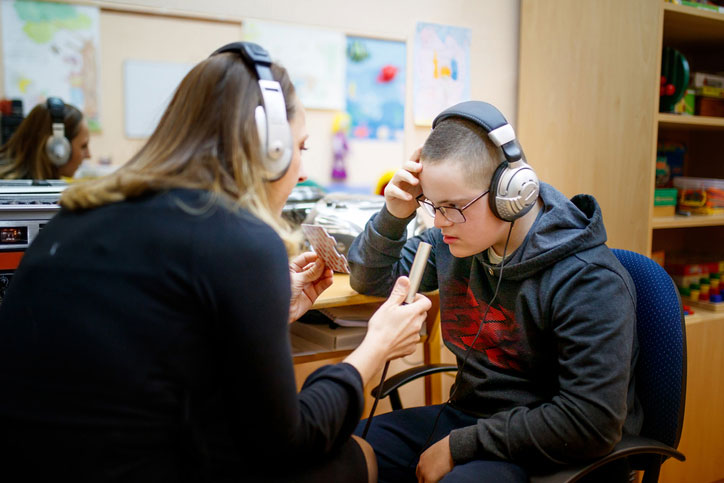Most people probably lump speech-language pathologists and audiologists in together, but both play separate, but critical roles in working with the hard-of-hearing and individuals with speech impediments.
Although speech and hearing are two different biological functions, with different mechanisms and processes behind them, when you track them both back to the brain you’ll find they are deeply tied together.
So while the jobs are related, restoring speech or hearing in any patient often requires both audiologists and speech pathologists. If you’re considering a career in the field, it pays to understand the different educational needs, licensing and certification requirements, and salary levels to expect for speech pathologists vs audiologists.
Audiology and Speech Language Pathology Are Closely Related Disciplines
 For speech pathologists to correct issues in speech and language, they have to know what is going on with the patient’s hearing. Hearing loss, after all, is one of the major contributors to many speech problems.
For speech pathologists to correct issues in speech and language, they have to know what is going on with the patient’s hearing. Hearing loss, after all, is one of the major contributors to many speech problems.
That’s where audiologists come in. Their training in testing hearing and diagnosing auditory disorders is critical for speech pathologists to design their own treatments. And audiologists have the expertise to fix speech disorders that stem directly from hearing problems by fixing those hearing issues directly.
In most cases, speech pathologists and audiologists work together closely to develop treatment plans and monitor progress.
What is the difference between a speech pathologist and an audiologist?
Audiologists are specialized doctors who test, diagnose, treat, and work to prevent hearing and balance problems. Speech pathologists deal with the mechanics of speech and related issues in the vocal tract, including issues that create problems chewing and swallowing properly.
What do speech pathologists and audiologists do?
Speech pathologists use language and muscular therapy, together with technology and compensation techniques, to help patients with their pronunciation, mouth and tongue movements, and throat and voice control. Audiologists test hearing and use medical and technical skills to find the root cause, and arrange treatment or prescribe hearing aids or aural rehabilitation to fix them.
How do speech pathologists and audiologists work together?
Typically, an audiologist will screen and monitor the hearing issues a patient experiences and inform an SLP what the diagnosis is. They may work together creating and leading auditory training, or the SLP may provide speech therapy based on the information the audiologist comes up with.
Speech Pathology and Audiology Have Different Educational Requirements
 A big gap emerges between audiologists and SLPs when you start looking at the amount of college required to enter each profession. Audiologists are required to have a doctoral degree, called an AuD (Doctor of Audiology), spending three to four years studying at an advanced level in order to become certified.
A big gap emerges between audiologists and SLPs when you start looking at the amount of college required to enter each profession. Audiologists are required to have a doctoral degree, called an AuD (Doctor of Audiology), spending three to four years studying at an advanced level in order to become certified.
SLPs also have stringent educational requirements at the graduate level, but may become certified with just the two-year master’s degree.
Finding a communication sciences and disorders undergraduate program is the first step toward becoming an audiologist or speech-language pathologist.
Already have your BA degree? Find a CAA-Accredited Speech-Pathology Master’s Program.
Audiologists spend their study hours learning about subjects such as:
- Anatomy and physiology of peripheral hearing
- Acoustic signals and vestibular system function
- Psychoacoustics
- Hearing aids
- Audio pathologies
It’s a heavy dose of technology and scientific detail of the human hearing system, learning about how it develops in early lifecycle stages and starts to fall apart later in life. There’s a big focus on technological solutions and diagnostics for hearing loss.
In an SLP program, meanwhile, students learn basic aspects of hearing and vestibular systems, but real focus on phonology and the mechanics of the vocal tract. Subjects can include:
- Phonological disabilities
- Dysphagia diagnosis and treatments
- Language disorders
- Muscular therapy and speech drills
Both kinds of programs stress hands-on learning, so practicum and externship placements are a big part of the training.
Is specialty accreditation important for audiology and speech-language pathology programs?
Yes! Fortunately, both professions rely on the same specialty accreditor: ASHA, the American Speech-Language-Hearing Association’s Council on Academic Accreditation (CAA). As of 2021, more than 300 accredited SLP programs and 80 accredited audiology clinical doctoral degrees are available.
What is a bachelor of audiology and speech-language pathology?
If you’re not sure which path you want to follow, there is a great option for you at the undergraduate level: a BS in Audiology and Speech-Language Pathology. These programs lay the groundwork for either a master’s in SLP or a doctorate in audiology with coursework in speech and hearing sciences, phonology disorders, neurology of speech and hearing, and rehabilitation techniques.
Why do speech-language pathologists need to know about audiology?
SLPs need a strong understanding of hearing because it’s so closely tied to our ability to speak. Humans learn speech through their ears. If something is going wrong in the auditory system, it’s almost inevitable that it will cause problems in vocalization. Without a clear idea of how those issues can be related, it’s impossible for SLPs to successfully treat those types of problems.
Why is the study of audiology important to the study of speech-language pathology?
Clearly understanding the connections between the auditory system and human speech is a big part of SLP training and degree programs. Without a strong command of audiology, SLPs are working in the dark when trying to rehabilitate many hearing-related speech pathologies.
What Speech Pathologist vs Audiologist Career Tracks Look Like
 In addition to the different educational tracks, speech pathology careers can look very different from audiology careers.
In addition to the different educational tracks, speech pathology careers can look very different from audiology careers.
Most speech pathologists work in education. According to ASHA, about 43 percent of SLPs are employed by schools or other educational services. They do a lot of hands-on therapy, developing unique treatment plans for patients and getting in a lot of direct contact. It’s a rewarding process to watch a patient who has had difficulty feeding themselves learn to chew and swallow properly, or see a kid who can’t communicate learn to form words.
Audiologists, on the other hand, primarily work in healthcare services such as clinics, hospitals, or in private practice. Their jobs can involve a lot more standardized diagnostic process, administering hearing tests or conducting technical evaluations. They routinely fit patients for hearing aids, also.
Licensing and Certification For Speech Pathologists vs Audiologists
Enrolling in a CAA-accredited speech-pathology graduate program is critical for getting a license. SLPs also have to complete a period of supervised training and pass the Praxis exam for speech-language pathology on their way to getting the Certificate of Clinical Competence in Speech-Language Pathology (CCC-SLP). That’s a national level board certification of competence that many employers look for to maintain high standards in the field.
ASHA also offers the CCC-A, which is the audiologist equivalent of the CCC-SLP. Audiologists have a different test to pass and more hours of supervised practice to fulfill, in line with their more advanced degree.
Every state has separate licensing requirements, but earning the CCC-SLP or CCC-A is either accepted itself as a qualification, or has standards that mean you will meet state rules across the country. Some states also require a jurisprudence exam from applicants in both fields.
Should I be an audiologist or a speech pathologist?
It’s always up to you to decide which kind of work you will enjoy more. But there is a big fat hint in the employment numbers that might tip you toward one or the other: the number of jobs for SLPs is expected to increase by 25% between 2019-2029, while it’s just 13% for audiologists. The fact that so many SLPs work in education means that if you enjoy working with kids, that might be your jam. Audiologists also frequently work with kids, but their practice base really covers all ages.
Can you be an audiologist and a speech pathologist?
You sure can! But don’t think it’s an easy path. You will have to meet the educational requirements for both professions and pursue certification and licensing in two different paths to get there. The American Speech-Language-Hearing Association (ASHA) reports that only 758 of its 218,000 members are certified in both professions.
Differences in Audiologist vs Speech Language Pathologist Salary
Let’s start off with the fact that these are both fun, well-paying jobs. You’re going to be working as a respected professional with a solid take-home salary, doing work that changes lives. That’s a kind of pay that you can’t take to the bank but would never give up, either.
Many people wonder about which job would pull down the biggest paychecks, though. But the difference between speech pathologist and audiologist salaries isn’t as big as you would expect based on the educational differences. According to the Bureau of Labor Statistics, in 2020 audiologists enjoyed a median annual salary of $81,030, while speech-language pathologists were paid $80,480.
At the top end, after years of experience and advanced certification, audiologists can make more than $128,160 while SLPs in the top ten percent earn over $122,790 per year.
Do audiologists get paid more than speech pathologists?
Although you can see from the median salaries that audiologists on average make just a little bit more than speech pathologists, that difference can evaporate depending on the industry you are working in. In hospitals, for instance, audiologists made $86,940, while speech pathologists actually win out slightly at an average of $87,110. You might also be interested in seeing what speech pathologist salaries by state look like, since there can be big geographic differences in pay.
- Emerson College - Master's in Speech-Language Pathology online - Prepare to become an SLP in as few as 20 months. No GRE required. Scholarships available.
- NYU Steinhardt - NYU Steinhardt's Master of Science in Communicative Sciences and Disorders online - ASHA-accredited. Bachelor's degree required. Graduate prepared to pursue licensure.
- Arizona State University - Online - Online Bachelor of Science in Speech and Hearing Science - Designed to prepare graduates to work in behavioral health settings or transition to graduate programs in speech-language pathology and audiology.
- Calvin University - Calvin University's Online Speech and Hearing Foundations Certificate - Helps You Gain a Strong Foundation for Your Speech-Language Pathology Career.
